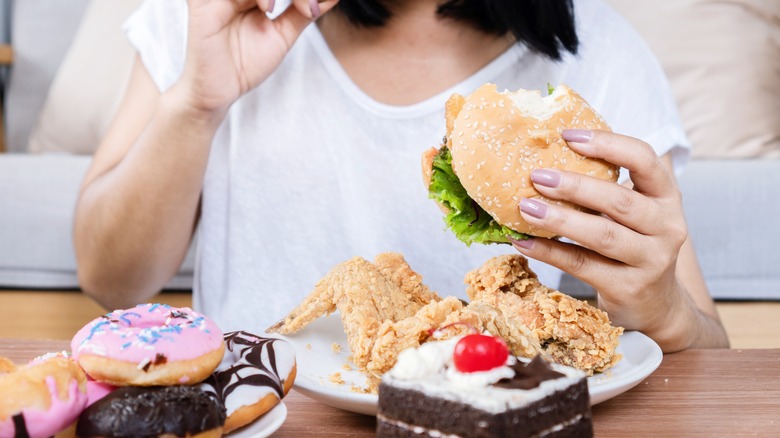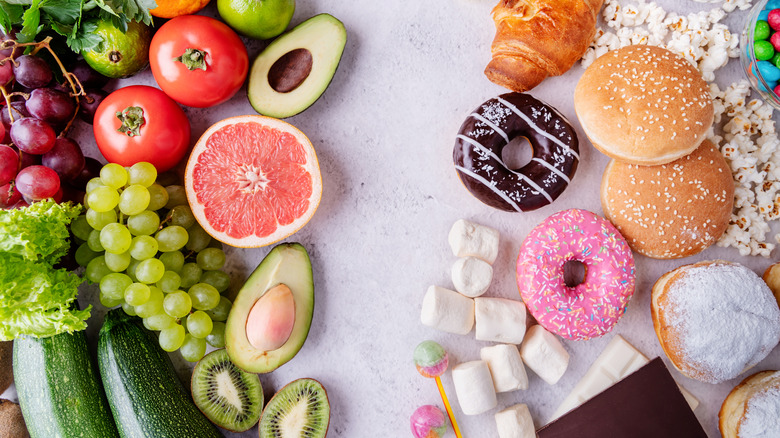Listening To Cravings Is The Best Thing You Can Do For Your Body. Here's Why
Ever wake up and know exactly what you want to eat for breakfast? Or maybe you scroll past a meal on Instagram, and suddenly it becomes your sole mission to eat it that day. Perhaps you're ending a night out, and the second someone says the word pizza, you've got Domino's on call. All of these scenarios describe what it's like to have a craving. Diet culture loves to tell us to curb our appetites, but it turns out you're probably better off curbing restrictive diet fads.
In her article with Poosh, celebrity nutritionist Serena Poon writes that "learning to embrace your cravings can help you explore some of your deeper connections — to food, your environment, and emotions." More and more dietitians today are siding with Poon, advocating for a nutrition philosophy known as "intuitive eating," says Very Well Health. There is tons of research supporting this approach to diet.
Why ignoring your cravings can backfire
By labeling some foods as "unhealthy" or "bad," dietician Jenn Baswick's blog explains that you can develop a poor relationship with eating. If you restrict yourself rather than listen to your body, you're likely to create unnecessary stress around food. Rahaf Al Bochi, RDN, LDN, tells Very Well Health that with intuitive eating, "chronic dieters break free from the cycle of dieting and heal their relationship with food and their body." According to Healthline, this diet mentality can lead to a variety of eating disorders, which are already peaking after having been triggered by the pandemic.
If you really want to cut back on a particular food, stopping yourself from eating it when you want to will likely be counterproductive. The International Journal of Eating Disorders published a study showing that women who cut out a specific food were more likely to heighten their cravings for it and overeat that food. If you are cutting out a food group to lose weight, this could also have the opposite effect. The medical journal Obesity Reviews published a study showing that chronic dieters often regain any weight lost with restrictive diets within 1-5 years. According to this same study, 33% of these dieters will gain weight that exceeds their start weight.
Intuitive Eating could redefine how you handle cravings
Intuitive eating could be the right choice for you if you are tired of overthinking your food choices and holding back from enjoying the foods you love. Although, it might not be a walk in the park. We live in a culture brimming with diets like the "cabbage soup diet," the Atkins diet, the ProLon diet, and many, many more. Because of this, there are several guidelines to unlearning this restrictive attitude toward food.
Very Well Health attributes the Intuitive Eating Movement to the dietitians Evelyn Tribole and Elyse Resch. The two published the book "Intuitive Eating: A Revolutionary Diet Approach." In this book, they detail ten steps to achieve freedom around food. In her article with Poosh, nutritionist Cara Clark remarks that intuitive eating still promotes healthy choices. But she explains that it is "a little more flexible and consistent ... in my experience, the more people don't feel like they're missing out, the more they can commit."
However, if your relationship with food is causing extreme distress or disordered behavior, jumping into intuitive eating on your own might not be the safest approach to healing.
If you need help with an eating disorder, or know someone who is, help is available. Visit the National Eating Disorders Association website or contact NEDA's Live Helpline at 1-800-931-2237. You can also receive 24/7 Crisis Support via text (send NEDA to 741-741).


